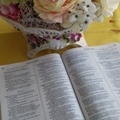[A devotional reflection originally prepared for the congregation of Horley Baptist Church during September 2024]
A recent comment on one of our earlier reflections posed a question: I was interested to know how you center yourself and clear your mind before writing? I’ve had a hard time clearing my mind in getting my ideas out. I do enjoy writing however it just seems like the first 10 to 15 minutes tend to be wasted. Perhaps this is an appropriate time to revisit the purpose for these reflections and explain how they come into reality.[1]
The Motive
“Oh that my words were written! Oh that they were inscribed in a book!”
Job 19 v23 [ESVUK]
Primarily, these reflections, on Sundays or during the week, are offered as an opportunity for God to send a message to his people. The same is true of daily reading plans and the morning and evening homilies common in many of the traditional denominations. It follows that the messengers must, themselves, be listening to God and that they must convey the message with integrity. Essentially, that means taking the time to wait on God and to listen for his prompting.
The Method
For we do not write to you anything you cannot read or understand.
2 Corinthians 1 v13 [NIVUK]
I grew up at a time when academic progress was judged by the ability to get down on paper, not just the correct answer to the questions but to do so with accurate grammar, spelling and legibility, and in a totally inadequate timescale. There is no such pressure when writing reflections (unless we forget our deadlines) but nevertheless it is helpful to introduce some discipline into our writing.
Slightly more recently, I recall professional documents being typed out in draft, then cut up with a pair of scissors and pasted back together in the preferred order. The document was then retyped and the process continued until the author was satisfied. Thank God for word processors!
With a word processor we can write words or phrases as snippets of text as they come to mind. We may or may not use them in the final article but constraints such as vocabulary and grammar can be dealt with later.
The Message
But these are written that you may believe that Jesus is the Messiah, the Son of God, and that by believing you may have life in his name.
John 20 v31 [NIVUK]
Of course, content is important. We need to engage with the reader. Ideally the title should engender a curiosity about the content but few people will read beyond the title if the document is poorly composed. If time permits, take a break, then come back and re-read what you have written. Does it say what you intended to say? Would you find it interesting even if someone else had written it? Most importantly, is it true to the message that you have received?
The Memento
In closing, we need a final thought for the reader to take away, ideally something that will provoke further thought or even a response. Often this can be a Bible verse or some lines from a hymn that are relevant to the preceding text. Here is one such example.
O let me hear Thee speaking, in accents clear and still,
above the storms of passion, the murmurs of self-will;
O speak to reassure me, to hasten or control!
O speak, and make me listen, Thou Guardian of my soul!
John Ernest Bode (1869)
References:
[1] see also ‘Preparing Reflections’, May 2020
Bible quotations: Unless otherwise specified, quotations are taken from the resources of Bible Gateway or Bible Hub, in accordance with the licencing conditions outlined on our Site Policies page.
Bible dates:
Where appropriate, the dates given for Biblical events are based on the Bible Timeline resource
and are subject to the constraints defined on the corresponding webpage.
 Horley Baptist Church online
Horley Baptist Church onlineHBC main site
Confidential prayer link
Link to Recent Reflections
Link to Index of Bible Passages
Last week’s reflection: The Bread, The Stone and the Nails
Contributed by Steve Humphreys; © Steve Humphreys

Thanks again Steve. Very helpful.